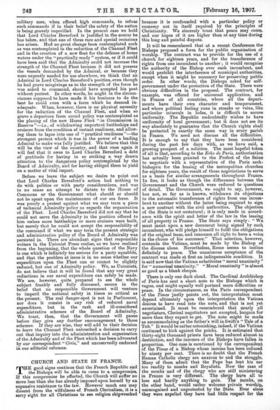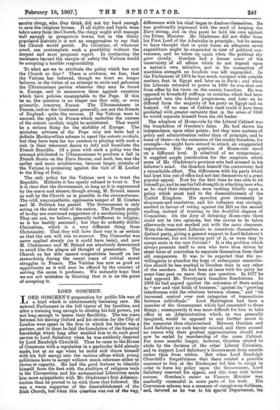011ITRCH AND STATE IN FRANCE.
good signs continue that the French republic and .1 the Bishops will be able to come to a compromise, If this compromise be effected, the Church' will suffer no more loss than she has already imposed upon herself by an expensive reaistaece to the law. However much one may dissent from the wilfulness of French Clericalism, it is a Berry sight for all Christians to see religion shipwrecked because it is confounded with a particular policy or economy not in itself required by the principles of Christianity. We sincerely trust that peace may Come, mid our hopes of it are higher than at any time during this long and painful dispute.
It will be remembered that at a receut Conference the Bishops proposed a form for the public organisation of worship. The contract was to provide for the use of a church for eighteen years, and for the transference of rights from one incumbent to another ; it would recognise the authority of the Bishop over each incumbent, and would prohibit the interference of municipal authorities, except when it might be necessary for preserving nubile order. In other words, the Bishops asked for self- government under the protection of the State. There were obvioua difficulties in the proposal. The contract, for example, was offered for universal application, aga in France of all countries, where all the depart- ments have their own character and temperameet, and where political feeling runs in streaks or veins, like particular minerals in lodes, it is difficult to secure uniformity. The Republic undoubtedly wishes to have uniformity of local government; but it does not see ite way absolutely to guarantee that the Church rights shall be protected in exactly the same way in every parish in France. We need not discuss all the difficulties. It is enough to say that they have been considered during the past few days with, as we have said, * growing prospect of a solution. The most hopeful token of all is that, according to the Echo de Paris, authorisation has actually been granted to the Prefect of the Seine to negotiate with a representative of the Paris arch- bishopric for the leasing of the metropolitan churchee for eighteen years, the result of these negotiations to serve as a basis for similar arrangements throughout Prance. In fine, it looks as though the differences between the Government and the Church were reduced to questione of detail. The Government, we ought to say, however, has not, so far as is known, withdrawn its objections to the automatic transference of rights from one incum- bent to another without the latter being required to sign a new contract with the civil authorities. The ebjection of the State is not unnatural; it is only made in accord- ance with the spirit and letter of the law in the leasing of all property in France. The State says simply : "We must insist upon a new document being signed by each incumbent, who will pledge himself to fulfil the obligatione of the original lease, and renounce all right to hare a voice in the choice of his successor." That selection, however, contends the Vatican, must be made by the Bishop of the diocese alone. Nevertheless, Rome seems to incline definitely to peace. The unanimous acceptance of the contract was made at first an indispensable condition. It is said now that the Vatican substitutes " moral unanimity!' for "numerical unanimity." "Moral unanimity" is almost as good as a blank cheque.
There is only one dark cloud, The Cardinal Archbishop of Paris has sent a short note to the Bishops which re vague, and might equally well portend more difficulties or peace. In the circumstances, as the Paris correspondent of the Times justly points out, the interpretation must depend ultimately upon the interpretation the Vatican desires to have read into the note, and that hi not yet ascertained.. It must be remembered that nearly all negotiators, Clerical negotiators not excepted, bargain for more than they expect to get. The note might be made as accommodating as the father's will in Swift's "Tale of a Tub." It would be rather astonishing, indeed, if the Vatican continued to kick against the pricks. A is estimated that thirty-eight thousand priests have been reduced alilleet tO destitution, and the incomes of the Bishops have fallen in proportion. One ease is 'mentioned by the correspondent of the Timcs or a. Bishop whose income has been reduced by ninety per cent. There is no doubt that the French Itoman Catholic clergy are anxious to end the struggle. Many of them admit that the Pope has Wet his ear too readily to Menke and Royalists. Now the case of the monks and of the clergy who are still ministering in France is very' different. The clergy halve all to lese and hardly anything to gain. The peas, on the other hand; would. rather welcome private worship, unrecognised and unprotected by the State. Ever since they were expelled they have had little respect for the
WennIAT ClerffY, who, they think, 4i4 net try hard enough to five the religious houses. If all rights and funds were taken away from the Church, the clergy might still manage well enough in prosperous towns, but in the thinly populated chstri3Ots it is not an exaggeration to say that the Churi would. perish. NCI Christian, of whatever greed, can contemplate such a possibility without the deepest and inost poignant regret. In continuing • the rethitnnen beyond the margin of safety the Vatican would be accepting a terrible responsibility.
To what are we to attribute the policy which has cost the Church so dear ? There is evidence, we fear, that the Vatican has believed, though we trust no longer believes, in the virtue of an attempt to unite and galvanise the Ultramontane parties wherever they may be found in Europe, and to inanceuvre them against countries which have policies unacceptable to the Pope. If this be so, the question is no longer one that only, or even primarily, concerns France. The Ultramontanes in France, and on the Continent generally, are not the friends of England : suite the reverse. If the Vatican were to succeed, the spirit in France which underlies the success of the entente cordiale might be embittered. That would be a serious thing for the stability of Europe. The mistaken advisers of the Pope may not have had a definite Machiavellian scheme to upset the entente cordiale, but they have been far too careless in playing with such a risk in their vehement desire to defy and humiliate the French Republic. Of a piece with such a policy was the attempt attributed to Ultramontanes to produce a fall in French Berries on the Paris Bourse, and such, too, was the earlier and more mischievous, because larger, mistake of the Vatican in protesting against the visit of M. Loubot tp the King of Italy.
The only policy for the Vatican now is to trust the Republic. Hitherto it has openly refused to trust it. Yet it is clear that the Government, so long as it is represented by the suave and sincere, though strong, M. Briand, means as well by the Church as is possible in the circumstances. The cold, unsympathetic, oppressive temper of M. Combes and M. Pelletan has passed. The Government is only acting on the clear wish of the nation. The French people of to-day are convinced supporters of a secularising policy. They are not, we believe, generally indifferent to religion, as is too hastily assumed ; but they do ardently dislike Clericalism, which is a very different thing from Christianity. That they will have their way is as certain as that the sun will rise to-morrow. The Concordat was never applied sternly (as it could have been), and now M. Olemenceau and M. Briand are absolutely determined to avoid like the plague all thought of persecution. The Church on her side cannot congratulate herself on her stewardship during the recent years of critical moral struggles in France. The Vatican has now as good an opportunity as it will ever be offered by the country of serving the cause it professes. We earnestly hope that we are not mistaken in thinking that it is on the point of accepting it.







































 Previous page
Previous page